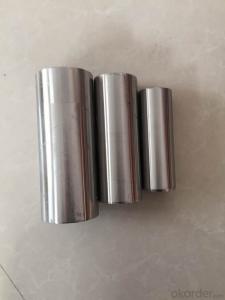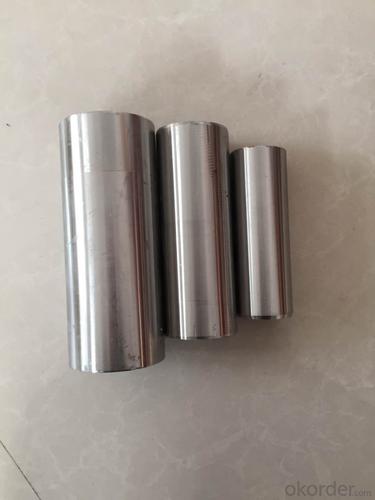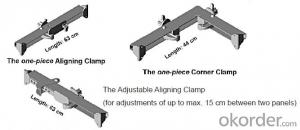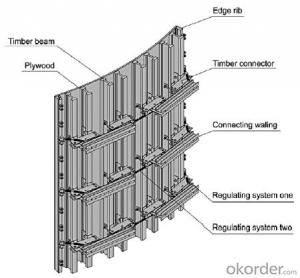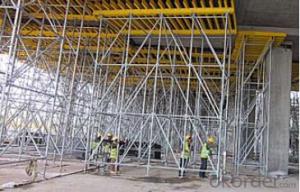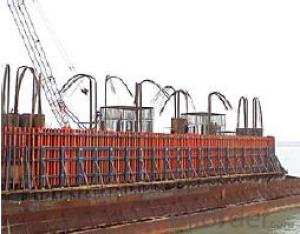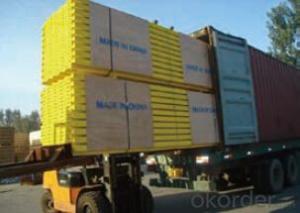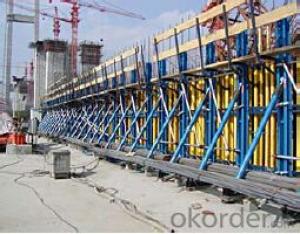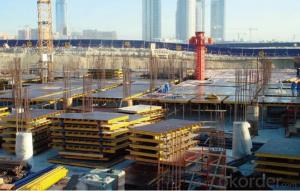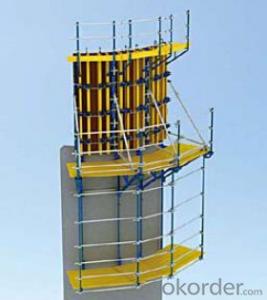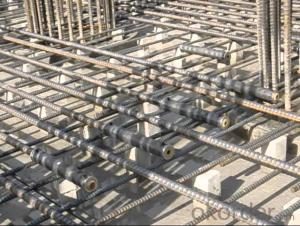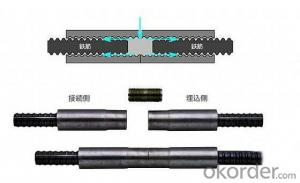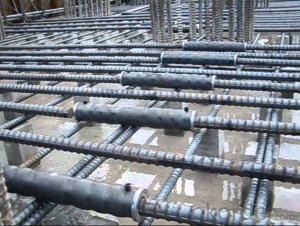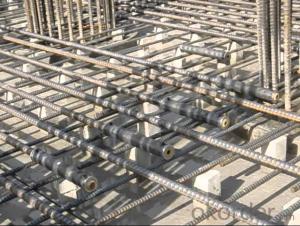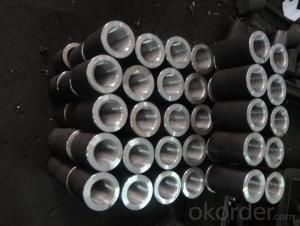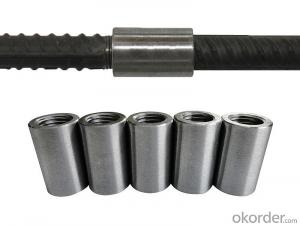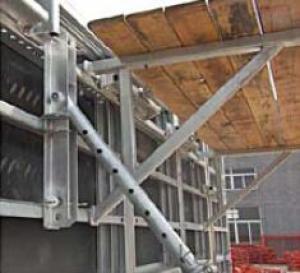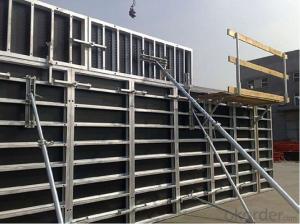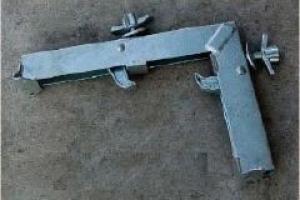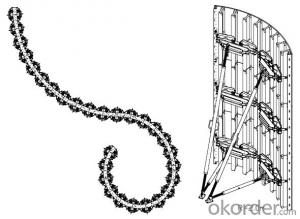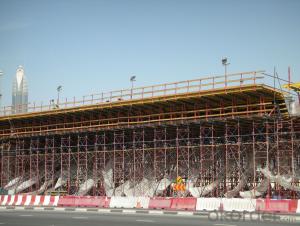Steel Coupler Rebar Aluminum Stair Scaffolding Scaffolding In Riyadh with Great Price
- Loading Port:
- Shanghai
- Payment Terms:
- TT OR LC
- Min Order Qty:
- 1000 pc
- Supply Capability:
- 10000000 pc/month
OKorder Service Pledge
OKorder Financial Service
You Might Also Like
Steel Coupler Rebar Aluminum Stair Scaffolding Scaffolding In Riyadh with Great Price
1.Description:
Lapped joints are not always an appropriate means of connecting rebar. The use of Steel Rebar Couplers can simplify the design and construction of reinforced concrete and reduce the amount of reinforcement required.
The threaded steel coupler system is designed as a threaded reinforcement connection with 100% load transmission. The steel coupler rebar connection system is suitable for both static and dynamic load transmission in construction joints.
The coupler is designed as a threaded reinforcement connection for formed construction joints. Reinforcement work is normally carried out on both sides of the construction joint using lap joints or one side is anchored. The bar lengths are based on the structural analysis requirements of the building component and are calculated from anchorage and lap lengths.
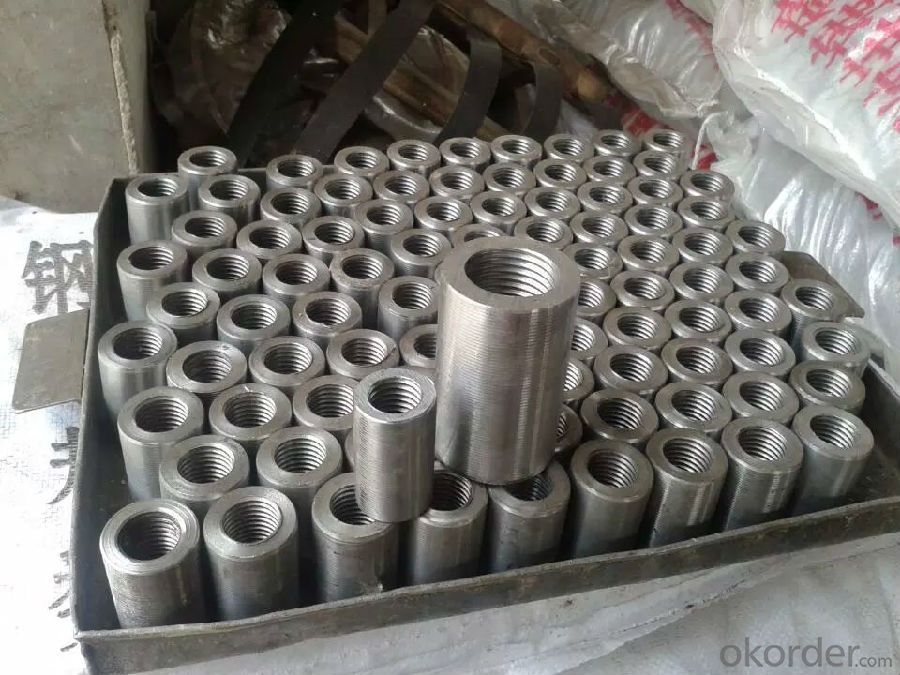

2.Advantages of Steel Coupler Rebar Lift Scaffolding Galvanized Scaffolding Tube with Low Price:
The coupler system provides the opportunity to connect rebars quickly, easily and cost effectively, even when large rebar diameters are used. This makes the steel coupler rebar range a logical extension to our rebendable CNBM reinforcement continuity system for rebars over 12 mm.
3.Available sizes of Steel Coupler Rebar Lift Scaffolding Galvanized Scaffolding Tube with Low Price:
14mm,16mm,18mm,20mm,22mmm,25mm,28mm,32mm,36mm,40mm
4.Delivery:
Delivery Term: FOB / CFR / CIF available.
Delivery Time: 15 days or less after order confirmed.
5.Why choose us?
Technical Expertise
Experienced Management
Stringent Quality Control
Exemplary Service
On-Time Delivery
Wide Product Range
Competitive Pricing
Huge branch network capable of catering worldwide
- Q: How does steel formwork contribute to the overall construction process?
- Steel formwork plays a crucial role in the overall construction process by providing a strong and durable framework for concrete structures. It offers numerous advantages over traditional wooden formwork, making it a preferred choice for many construction projects. Firstly, steel formwork is highly durable and can withstand multiple uses, resulting in cost savings as it does not require frequent replacement. This longevity also contributes to sustainability in construction, reducing waste and environmental impact. Secondly, steel formwork offers excellent strength and stability, ensuring the integrity of the concrete structure. It can withstand high pressures and vibrations during the pouring and curing process, resulting in a smooth and even finish. The precision and accuracy provided by steel formwork also help in achieving the desired dimensions and shape of the concrete structure. Moreover, steel formwork is highly adaptable and customizable, allowing for flexibility in design and construction. It can be easily adjusted or modified to accommodate changes in the architectural or engineering plans, saving time and effort. This flexibility also enables the construction of complex and intricate structures, such as curved or sloped walls, which would be challenging to achieve with traditional formwork methods. Another significant advantage of steel formwork is its reusability. Unlike wooden formwork, which is typically discarded after a few uses, steel formwork can be dismantled, cleaned, and reused on multiple projects. This not only reduces construction costs but also minimizes waste generation and promotes sustainable construction practices. In addition to its durability and adaptability, steel formwork offers improved construction speed and efficiency. Its lightweight nature allows for easy handling and assembly, reducing labor and construction time. The smooth surface of steel formwork also aids in quick and efficient concrete pouring and finishing. Overall, steel formwork contributes to the overall construction process by providing a sturdy, versatile, and reusable framework for concrete structures. Its durability, strength, adaptability, and efficiency make it an indispensable tool in modern construction, ensuring the successful and timely completion of projects while maintaining high-quality standards.
- Q: How does steel formwork impact the overall construction cost?
- Steel formwork is a popular choice in the construction industry due to its durability, versatility, and reusability. When considering the impact of steel formwork on overall construction cost, several factors should be taken into account. Firstly, steel formwork offers a longer lifespan compared to traditional timber formwork, reducing the need for frequent replacements. This longevity leads to cost savings as the initial investment in steel formwork can be spread across multiple construction projects, eliminating the need for continuous purchases of new formwork materials. Additionally, steel formwork is known for its superior strength and stability. It can withstand higher concrete pressures, allowing for taller and more complex structures to be constructed. This enables builders to maximize floor space and increase the overall efficiency of a project, ultimately reducing construction time and costs. Moreover, steel formwork provides a smooth and consistent finish to concrete surfaces, resulting in less need for additional finishing work. This reduces labor costs and the time required for subsequent trades to commence their work, contributing to overall cost savings. Furthermore, steel formwork is designed to be easily assembled and disassembled, enabling faster construction processes. This efficiency translates into reduced labor costs and shorter project durations, ultimately impacting the overall construction cost. However, it is worth noting that the initial investment in steel formwork can be higher compared to other formwork materials such as timber or aluminum. Nevertheless, the long-term benefits and potential cost savings associated with steel formwork outweigh this initial expense. In conclusion, steel formwork positively impacts the overall construction cost by providing durability, reusability, and efficiency. Its longer lifespan, strength, and ease of use contribute to cost savings through reduced material replacements, shorter project durations, and minimized finishing work. Despite the higher initial investment, the numerous advantages of steel formwork make it a cost-effective choice for construction projects.
- Q: How does steel formwork affect the overall construction waste generation?
- Steel formwork can significantly reduce overall construction waste generation. Unlike traditional timber formwork, steel formwork is reusable, durable, and can be used for multiple construction projects. This means that less formwork material needs to be discarded and replaced after each use, reducing the amount of waste generated. Additionally, steel formwork is easier to clean and maintain, further reducing wastage. Overall, the use of steel formwork in construction projects helps minimize waste generation and promotes sustainable construction practices.
- Q: Can steel formwork be used for both single-storey and multi-storey structures?
- Yes, steel formwork can be used for both single-storey and multi-storey structures. The versatility and strength of steel make it suitable for various construction projects, regardless of the number of storeys in the building. Steel formwork offers durability, easy assembly, and reusability, making it a popular choice for both small and large-scale construction projects.
- Q: How long does it take to set up steel formwork?
- The time required to set up steel formwork varies depending on several factors. These factors include the complexity of the structure, the level of experience and skill of the workers, the size of the project, and the availability of equipment. In general, the setup of steel formwork can take anywhere from a few hours to several days. For smaller projects with simple structures, a team of experienced workers can usually complete the formwork setup within a day or two. This involves tasks like measuring and marking the layout, assembling the steel panels, beams, and props, and securing them in place. Additionally, braces and ties may be attached to ensure stability and alignment. On the other hand, larger and more intricate projects may require more time for formwork setup. These projects may include complex designs, multiple levels or floors, and a greater number of formwork components. In such cases, the setup process may take several days or even weeks, depending on the size of the team and the availability of resources. It is worth noting that although steel formwork may take longer to set up compared to other types of formwork like timber or plastic, it offers advantages such as durability, reusability, and enhanced stability. These benefits outweigh the additional time required for setup, particularly for large-scale construction projects that necessitate robust and dependable formwork systems.
- Q: How does steel formwork handle different concrete surface sealing products?
- Steel formwork is a commonly used material in the construction industry for creating molds or structures to pour concrete into. When it comes to handling different concrete surface sealing products, steel formwork has certain advantages and considerations. Firstly, steel formwork is highly durable and robust, which makes it well-suited to withstand the application of different concrete surface sealing products. These sealing products, such as epoxy coatings, polyurethane sealers, or acrylic sealants, are typically designed to enhance the durability, aesthetics, and resistance of the concrete surface. Steel formwork can handle the application process without getting damaged or compromised. Secondly, steel formwork provides a smooth and even surface for the application of concrete surface sealing products. This is crucial as a proper seal requires an even and consistent application to ensure optimal performance. Steel formwork, when properly constructed and maintained, can provide the necessary level of precision and flatness needed for the successful application of sealing products. However, it is important to note that steel formwork may require additional preparation and precautions when using certain concrete surface sealing products. For example, if a sealing product requires a clean and porous surface for proper adhesion, the steel formwork may need to be treated or roughened to create the desired surface texture. This can be achieved through techniques such as sandblasting or applying a bonding agent. Furthermore, steel formwork should be properly cleaned and free from any residues or contaminants before applying concrete surface sealing products. Any residual concrete, oils, or dirt on the formwork may interfere with the adhesion and performance of the sealing products. Regular maintenance and cleaning of the steel formwork are essential to ensure its compatibility with different concrete surface sealing products. In conclusion, steel formwork is a reliable and sturdy material that can handle different concrete surface sealing products. Its durability, precision, and smooth surface make it a suitable choice for the application of various sealing products. However, additional preparation, maintenance, and cleaning may be required to ensure optimal compatibility and performance.
- Q: Can steel formwork be used for precast concrete walls?
- Precast concrete walls can indeed utilize steel formwork. Steel formwork is widely employed in the construction industry due to its robustness, longevity, and reusability. It furnishes a stable and sturdy structure for the casting and molding of concrete during the manufacturing process of precast concrete walls. The utilization of steel formwork is appropriate for precast concrete walls because it can endure the pressure exerted by the wet concrete without bending or distorting. It guarantees that the concrete is poured and solidified in the desired shape and dimensions. Additionally, steel formwork can be effortlessly assembled and disassembled, enabling efficient and cost-effective production of precast concrete walls. An added benefit of employing steel formwork for precast concrete walls is its ability to generate smooth finishes. The steel panels or molds can be fashioned to create diverse textures and patterns on the final wall surface. This adaptability allows for increased design options and aesthetic appeal in the end product. Furthermore, steel formwork can be reused numerous times, making it an environmentally friendly and economical choice for precast concrete wall production. The durability of steel ensures that it can withstand the repetitive strains of the manufacturing process without significant deterioration. To summarize, due to its strength, durability, reusability, and capacity to produce smooth finishes, steel formwork is a suitable material for precast concrete walls. It establishes a solid framework for the molding and casting of concrete, permitting efficient and cost-effective production of precast concrete walls.
- Q: Can steel formwork be used for sports complex construction projects?
- Yes, steel formwork can be used for sports complex construction projects. Steel formwork is a versatile and durable option for creating temporary molds or structures for casting concrete. Its strength and flexibility make it suitable for various construction projects, including sports complexes. Steel formwork can provide the necessary support and stability required during the construction process, ensuring the efficient and accurate placement of concrete in complex shapes and designs.
- Q: Can steel formwork be used for industrial flooring?
- Indeed, industrial flooring can be constructed using steel formwork. Renowned for its robustness and resilience, steel formwork proves to be well-suited for demanding tasks, particularly in heavy-duty applications like industrial flooring. It possesses the ability to withstand the substantial weight and pressure imposed by heavy machinery and equipment, presenting a reliable and firm foundation for industrial operations. Moreover, steel formwork boasts the added benefit of reusability, rendering it a financially prudent option for industrial flooring.
- Q: How does steel formwork affect the overall construction material waste reduction?
- Steel formwork can significantly contribute to the reduction of construction material waste. Unlike traditional formwork materials such as timber, steel formwork is highly durable and reusable, minimizing the need for constant replacement. Its strength and longevity allow for multiple uses in various construction projects, reducing the overall consumption of materials. Additionally, steel formwork is easily adjustable and customizable, resulting in more efficient and accurate construction processes, further reducing waste. Overall, the use of steel formwork helps minimize material waste and promotes sustainable construction practices.
Send your message to us
Steel Coupler Rebar Aluminum Stair Scaffolding Scaffolding In Riyadh with Great Price
- Loading Port:
- Shanghai
- Payment Terms:
- TT OR LC
- Min Order Qty:
- 1000 pc
- Supply Capability:
- 10000000 pc/month
OKorder Service Pledge
OKorder Financial Service
Similar products
Hot products
Hot Searches
